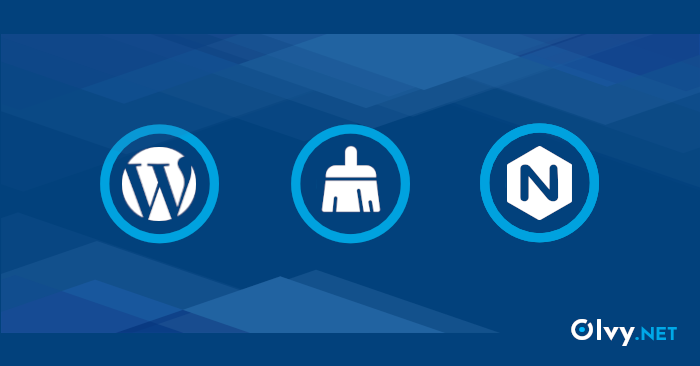How to Fix NGINX Cache Purge on Debian 12 with Custom PHP-FPM Users

When running NGINX with caching on Debian 12, you may discover that cache purging doesn’t work if your PHP-FPM pool runs under a custom system user instead of the default www-data. This problem becomes very real in multi-tenant environments or whenever you separate applications into isolated users for security.
UPDATE: You may encounter a similar issue in Ubuntu 24.04 and Debian 13. The solution described below also applies to these OS versions. However, you should take into account the specific configurations and package versions of Ubuntu 24.04 and Debian 13.
Contents
The Problem: Purge Fails with Default Setup
By default, Debian’s packaged NGINX plus the ngx_http_cache_purge module cannot properly purge cache entries if your PHP-FPM is not running as www-data. The reason is simple:
- The NGINX cache directory (e.g.,
/var/cache/nginx/) belongs to www-data. - Purge requests routed via PHP-FPM running as another user (say myusername) cannot remove cache files, because of a permissions mismatch.
- The purge appears to “fail silently” – often returning
404 Not Foundinstead of actually deleting cache entries.
In short: if your PHP-FPM pools run under custom users (a best practice), the stock Debian module just won’t cut it.
Before You Begin
This guide assumes that you already have NGINX installed and configured with a working cache (e.g. using proxy_cache_path or fastcgi_cache_path). The steps below focus only on adding purge functionality, so we won’t cover the initial cache configuration itself. If your NGINX is already caching responses successfully, you’re ready to proceed with building and enabling the purge module.
The Solution: Build the Cache Purge Module from Source
Debian provides official source packages that make it straightforward to rebuild additional modules. This ensures your compiled ngx_http_cache_purge_module matches the exact NGINX version and build flags shipped with Debian 12.
1. Enable Source Repositories
Make sure /etc/apt/sources.list includes deb-src entries. For Debian 12 (Bookworm), you should have lines like:
deb http://deb.debian.org/debian bookworm main deb-src http://deb.debian.org/debian bookworm main deb http://deb.debian.org/debian bookworm-updates main deb-src http://deb.debian.org/debian bookworm-updates main deb http://security.debian.org/debian-security bookworm-security main deb-src http://security.debian.org/debian-security bookworm-security main
Update your package lists:
apt update2. Install Build Dependencies
You’ll need development tools and the dependencies required to compile NGINX:
apt install dpkg-dev build-essential libpcre3-dev libssl-dev zlib1g-dev libxml2-dev libxslt1-dev libgd-dev libgeoip-dev libperl-dev3. Fetch the NGINX Source
Download the NGINX source package:
apt source nginxThis will create a directory like nginx-1.22.1/ in your current working folder.
4. Download the Purge Module
Get the module source from GitHub:
wget https://github.com/torden/ngx_cache_purge/archive/refs/tags/v2.3.1.tar.gzUnpack the module sources:
tar xzf v2.3.1.tar.gz5. Build the Module
Go into the unpacked NGINX source directory and re-run the configure step with the same flags Debian uses, adding the purge module:
cd nginx-1.22.1./configure --add-dynamic-module=../ngx_cache_purge-2.3.1 --with-cc-opt='-g -O2 -ffile-prefix-map=/build/nginx-nduIyd/nginx-1.22.1=. -fstack-protector-strong -Wformat -Werror=format-security -fPIC -Wdate-time -D_FORTIFY_SOURCE=2' --with-ld-opt='-Wl,-z,relro -Wl,-z,now -fPIC' --prefix=/usr/share/nginx --conf-path=/etc/nginx/nginx.conf --http-log-path=/var/log/nginx/access.log --error-log-path=stderr --lock-path=/var/lock/nginx.lock --pid-path=/run/nginx.pid --modules-path=/usr/lib/nginx/modules --http-client-body-temp-path=/var/lib/nginx/body --http-fastcgi-temp-path=/var/lib/nginx/fastcgi --http-proxy-temp-path=/var/lib/nginx/proxy --http-scgi-temp-path=/var/lib/nginx/scgi --http-uwsgi-temp-path=/var/lib/nginx/uwsgi --with-compat --with-debug --with-pcre-jit --with-http_ssl_module --with-http_stub_status_module --with-http_realip_module --with-http_auth_request_module --with-http_v2_module --with-http_dav_module --with-http_slice_module --with-threads --with-http_addition_module --with-http_flv_module --with-http_gunzip_module --with-http_gzip_static_module --with-http_mp4_module --with-http_random_index_module --with-http_secure_link_module --with-http_sub_module --with-mail_ssl_module --with-stream_ssl_module --with-stream_ssl_preread_module --with-stream_realip_module --with-http_geoip_module=dynamic --with-http_image_filter_module=dynamic --with-http_perl_module=dynamic --with-http_xslt_module=dynamic --with-mail=dynamic --with-stream=dynamic --with-stream_geoip_module=dynamicWhen finished, you should have:
objs/ngx_http_cache_purge_module_custom.so6. Install and Enable the Module
(a) Copy the compiled .so module to any Debian 12 machine with NGINX 1.22.1 installed, into the Debian modules directory, like:
/usr/lib/nginx/modules/ngx_http_cache_purge_module_custom.so(b) Create configuration file:
/etc/nginx/modules-available/50-mod-http-cache-purge-custom.confWith content:
load_module modules/ngx_http_cache_purge_module_custom.so;(c) Remove (“disable”) the symbolic link to the configuration file that loads the default ngx_http_cache_purge_module.so in /etc/nginx/modules-enabled/ to avoid loading the default and custom modules at the same time:
rm /etc/nginx/modules-enabled/50-mod-http-cache-purge.conf(d) Create a symbolic link to the configuration file that loads the custom ngx_http_cache_purge_module_custom.so :
ln -s /etc/nginx/modules-available/50-mod-http-cache-purge-custom.conf /etc/nginx/modules-enabled/50-mod-http-cache-purge-custom.conf(e) Test and reload:
nginx -t systemctl reload nginx
Why This Matters
With the custom-built purge module:
- Cache purge requests succeed even when PHP-FPM pools run under non-www-data users.
- WordPress and other CMS plugins that rely on cache invalidation start working reliably again.
- You keep the security and isolation benefits of per-site system users without breaking cache management.
Rebuilding the purge module from Debian sources gives you both compatibility and reliability, ensuring your cache strategy works seamlessly in secure, multi-user environments.
About Olvy ( www.olvy.net / www.olvy.eu ) :
Olvy is a private and independent Limited Liability Company based in Bratislava, Slovakia, in the heart of Europe. We combined our invaluable 20+ years experience to develop innovative and reliable, lightning-fast and affordable Managed Cloud Hosting services for Everyone. From a small blog to a growing eCommerce – Olvy takes care of your website 24/7.
